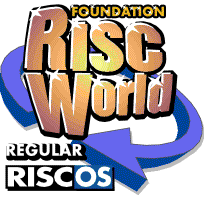



DiscWorld
Aaron Timbrell rounds up the software directory
This issue we are back with something else for RISC OS games players. We gave away a 'serious' piece of business software last issue, Chartwell, so now it's time to get cracking, or indeed get hacking...
Desktop Hacker rrp £10.00
Desktop hacker is a unique package for RISC OS computers. It allows you to modify pretty much all the the behaviour of nearly all RISC OS games. The version we are including is both StrongARM and RISC OS 4 compatible. We are also including an updated version of the manual in HTML format as well as hundred of cheat modules for lots of well known RISC OS games.
As well as being an invaluable tool for keen RISC OS gamers, Desktop Hacker can also be a godsend for developers who are working with third party applications with no source code. If you can hack a game, then you can hack an application.
This latest version of Desktop Hacker has the following improvements over the earlier versions:
- Assembler - If you click Select on the left-hand side of the window, where the address, word and string values are, you'll get the same word-altering window as before. But if you click to the right, where the mnemonic is displayed, you'll get the new assembler window, in which the mnemonic can be edited directly. This assembler only supports ARM2 instructions, so not all instructions that Desktop Hacker can disassemble can be successfully re-assembled. The assembler is part of the GoodTimes module (not to be confused with the virus hoax of the same name), written by Laurence Tratt and Andrew Clover.
- Speed up - The slow-down window (now known as'Game speed') has been extended to allow you to speed the game up as well as slow it down. This is much less likely to work than slow-down, unless you have a fast processor that can run the games faster, or the game is clever enough to adjust its speed automatically.
- Don't keep screen display - This is useful for users of computers with little free memory, but it does disable the screenshot-saving feature, as well as corrupting the screen display of most games. The option, found on the Choices window, should be left off most of the time. Enable it only if you need to hack a game that normally needs almost all of your memory. Game position files saved out with this option enabled cannot be loaded into versions of Desktop Hacker earlier than 1.07.
- Squashed game files - Squashed game files are now supported, so you will often be able to fit a saved game or two on a single floppy disc. Squashed games are only available on machines which have Squash loaded (ie. RISC OS 3.), and the squashed game files produced by default by Desktop Hacker 1.06 and later will not load into Desktop Hacker 1.05 and earlier.
- Memory reserving - Memory reserving. Some games (eg. Dune 2, Wolf 3D) deliberately claim all the memory free in the computer. Then when Desktop Hacker tries to interrupt, there's no free memory. If you get the 'Not enough memory...' error even when you've left vast amounts of free memory, try going to the Choices window, selecting the 'Reserve' option, and entering how much memory you want to reserve. Increase this if you continue to get the error.
- Task forking - Games with WIMP front-ends in particular may trigger this feature: when a task being hacked launches another task, a window will appear querying whether you wish to continue hacking the old task, or follow the new one started up by it. You should usually 'Follow' the new task, as that'll be the game itself (that you want to hack), whereas the old task will be the front-end. (Which you don't.)
- HackPoints - A system of breakpoints has been introduced including SWI trapping (as in the original Hacker). HackPoints are only accessible from the command line - see the help for commands *SetHackPoint, *ClearHackPoint and *ListHackPoints.
The complete DiscWorld line up
As per usual we have our collections of the latest RISC OS applications, as well as support files for this issues articles:
Arthur
Support materials for the article about Arthur (the precursor to RISC OS).
BASIC3D
Example files for our article on 3D programming in BASIC.
Calibre
The latest version of Calibre, the RISC OS calendar generator.
Desktop Hacker
A great package for RISC OS games players and developers alike.
Iyonix
Software featured in the Iyonix column.
Letters
Software covered in the letters column.
PD
All the latest PD, shareware and freeware releases from the PD column.
ToolBox
This contains two sets of Toolbox Modules. The Castle archive contains the latest 26/32 bit neutral system components, required if you want to run a lot of new software releases on 26bit machines. The RISCOS Ltd archive contains later and improved versions of a number of modules and is suitable for all versions of RISC OS from 3.1 onwards. We have also included copies of SharedUnixLib and UnixHome as these are needed by some programs.
Aaron Timbrell